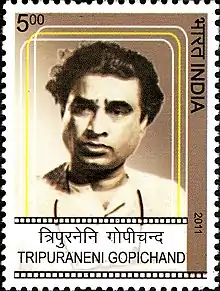Tripuraneni Gopichand
Tripuraneni Gopichand (8 September 1910 – 2 November 1962) was a Telugu short story writer, novelist, editor, essayist, playwright, film director, and a radical humanist. Gopichand was the son of renowned social reformer and play writer Tripuraneni Ramaswamy. Gopichand, inspired by M.N.Roy's Radical Humanism, became the first state secretary of the Radical Democratic Party (India) Andhra Pradesh.[1] His second novel Asamardhuni Jivayatra (Bungler: A Journey Through Life), was the first psychological novel in Telugu literature.[2] Gopichand was posthumously awarded the Sahitya Akademi Award for Pandita Parameswara Sastri Veelunama in 1963, the first Telugu novel to win this award.[3] [4] His novels typically features gloomy, incomplete, unsatisfied and unsatisfying protagonist tortured by a sense of guilt.[5]
Tripuraneni Gopichand | |
|---|---|
 Tripuraneni Gopichand | |
| Born | 8 September 1910 Angaluru, Krishna district, India |
| Died | 2 November 1962 (aged 52) |
| Pen name | Tripuraneni Gopichand |
| Occupation | Novelist, short story writer, essayist, playwright, editor, film director |
| Nationality | Indian |
| Citizenship | India |
| Education | Law |
| Notable works |
|
| Spouse | Sakuntala devi |
| Parent(s) |
|
| Children | Tripuraneni Pramila, Ramesh Babu, Rajani, Ramgopal, Nalini, Sai Chand |
| Relatives | Pitcheswara Rao Atluri |
His novel "Asamardhuni Jeeva Yatra", is part of the syllabus for APPSC examinations in Telugu literature as an optional subject.
A postal stamp in his honour was released by the Government of India on his 100th birthday.[6][7]
List of Writings
Novels
- Parivartanam
- Asamardhuni Jivayatra (first psychoanalysis novel in Telugu)
- Merupula Marakalu
- Pandita Parameswara Sastry Veelunaama
- Yamapasam
- Cheekati Gadulu
- Sidhilalayam
- Gadiya Padani Talupulu
- Gatinchanigatam
- Pillatemmera
- Premopahatulu
Non-fiction
- Tatvavettalu
- Postu Chaiyani Uttarulu
- Maku Unnayi Swagataalu
- Vubhayakusalopari
Filmography of Telugu films
- Chaduvukunna Ammayilu (1963) (Dialogues)
- Dharmadevatha (1952) (Dialogues)
- Priyuralu (1952) (Story, Dialogues and Direction)
- Perantalu (1951) (Director)
- Lakshmamma (1950) (Director)
- Gruhapravesam (1946) (Story)
- Raithubidda (1939) (Dialogues)
Family tree
- T._Ramaswamy_Choudary
- Tripuraneni_Gopichand
- Tripuraneni Sai Chand (Actor)
- Tripuraneni_Gopichand
References
- "Scientific humanism". 3 November 2010.
- "DVNarasaRaju &TGopichand-Writers". Lamakaan. 2 November 2013. Archived from the original on 24 February 2014.
- "Sahitya Akademi.Awards.Telugu". Sahitya-akademi.gov.in. Retrieved 26 February 2014.
- "Asamardhuni Jeeva Yatra By Tripuraneni Gopichand". Scribd.com. Retrieved 26 February 2014.
- Anjaneyulu, D. (1964). "A Novel of Modern Andhra". Indian Literature. New Delhi: Sahitya Akademi. 7 (2): 23. ISSN 0019-5804. JSTOR 23329244.

- "tripuraneni gopichand stamp | Phila-Mirror". 8 September 2011. Retrieved 26 February 2014.
- Special Correspondent (11 September 2011). "'Literature is social documentation'". The Hindu. Retrieved 26 February 2014.
External links